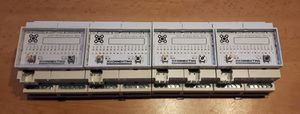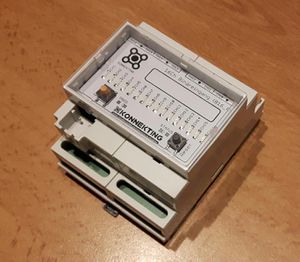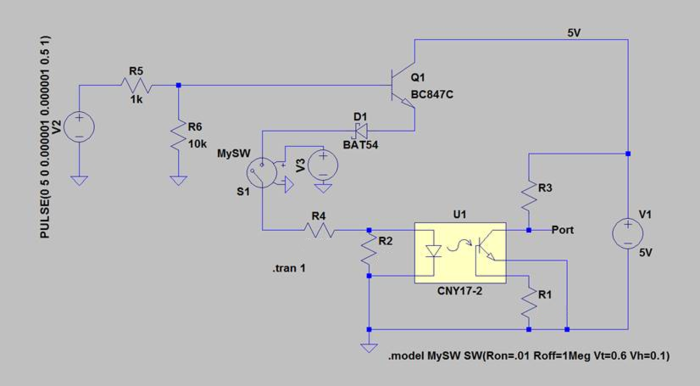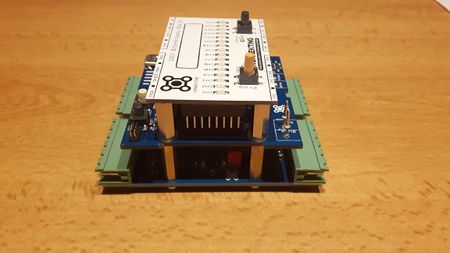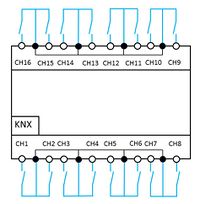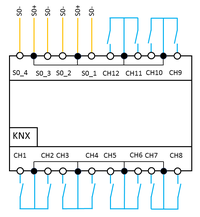Difference between revisions of "16CH Binary Input"
Jump to navigation
Jump to search
| Line 28: | Line 28: | ||
=== Technical Data: === | === Technical Data: === | ||
| − | * 16 Inputs (potential-free / floating contacts | + | * Operating voltage KNX Bus voltage <10mA |
| − | * | + | * Installation type Top Hat Rail mounting |
| − | * | + | * Number of Inputs 16 |
| − | * | + | * Number of S0-Inputs 4 (CH13 - CH16) |
| − | * | + | * Input polling with 100ms, 300ms or 500ms |
| + | * Typ of Inputs potential-free / floating contacts | ||
| + | * Max. cable length 30m tested (more possible) | ||
| + | * input voltage 5V | ||
| + | * Max. input voltage 24V (absolute rating, for <1min) | ||
| + | * Max. input current 10mA | ||
| − | + | * '''The device makes a contact supply voltage (5V) which is '''not''' electrically isolated from the bus voltage!''' | |
| − | * | ||
| − | |||
| − | |||
| − | + | * x-Inputs can configure to a "room" ("room"-GA can show if one of the windows is open in the room) | |
| − | * | ||
| − | |||
== Schematic == | == Schematic == | ||
Revision as of 09:53, 23 February 2018
| 16CH Binary Input | |
|---|---|
| Developer | Matthias F. |
| Status | Version 1.0 finished |
| Microcontroller/Board | |
| KNX connectivity | Mini-BCU |
Description
16ch Binary Input (potential-free)
The binary input has 16 inputs available and is used to connect eight conventional push-buttons or floating contacts such as window or relay contacts. There is one status LED for each input. In addition, the input status is sent to the bus. A separate power supply is not necessary
Technical Data:
- Operating voltage KNX Bus voltage <10mA
- Installation type Top Hat Rail mounting
- Number of Inputs 16
- Number of S0-Inputs 4 (CH13 - CH16)
- Input polling with 100ms, 300ms or 500ms
- Typ of Inputs potential-free / floating contacts
- Max. cable length 30m tested (more possible)
- input voltage 5V
- Max. input voltage 24V (absolute rating, for <1min)
- Max. input current 10mA
- The device makes a contact supply voltage (5V) which is not electrically isolated from the bus voltage!
- x-Inputs can configure to a "room" ("room"-GA can show if one of the windows is open in the room)
Schematic
Hardware
What you need
for this device do you need:
- 1x OKW Housing
- 1x PCB Kit
- 1x Mounting Kit (screws, ...)
OKW Housing link OKW-Website:[1] 1x B6503121 RAILTEC B, 4 Module 3x B6607140 Klemmenabdeckung, flach 1x B6607145 Abdeckung KNX, flach 4x B6607142 Klemmenabdeckung, flach (1x) B6603180 Frontplatte, 4 Module (only if you don't use the "LED-Status-PCB"
PCB Kit: 1) Application PCB 2) Controller PCB 3) LED-Status PCB (for function not necessary, only to show the status of the Inputs) 4) Mini-BCU (KNX-Transceiver)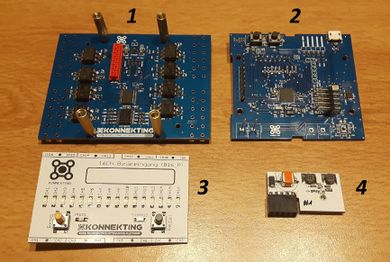
Mounting Kit 4x
Software
What you need
- Arduino IDE (link)
- Arduino Code for 16CH Binary Input
- XML-File for 16CH Binary Input
- KONNEKTING SUITE (link)
